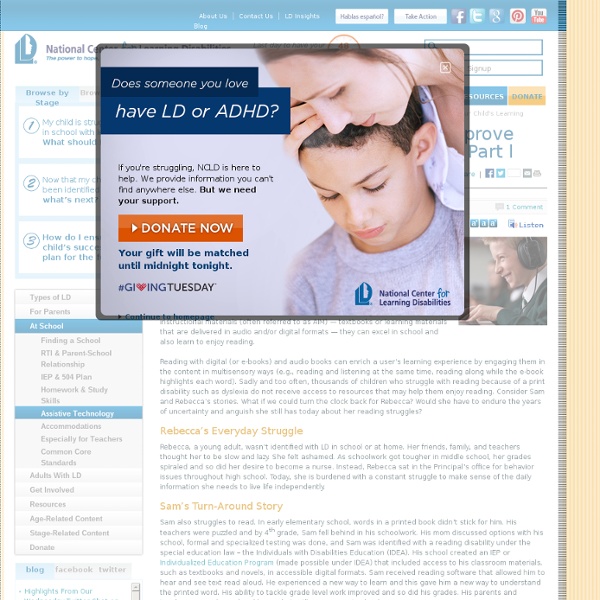Technology-assisted reading: a helping tool in our crisis | innovating education
Given that South African learners are of the poorest readers in the world, how do we improve their reading skills using technology? This was the question posed by Gerda van Wyk and Arno Louw of the University of Johannesburg in their ICeL paper: Technology-Assisted Reading for Improving Reading Skills for young South African Learners. Apparently improving the reading skills of learners through technology-assisted reading programs is a controversial issue: those against it argue that reading on a screen will not improve reading on paper and that screen reading is not a “normal way” of reading. However, there are many voices for it, who acknowledge the role that technology can play in administration, evaluation and being adaptible to learner skill changes. In an attempt to assess the efficacy and appropriateness of this approach for South Africa (SA), the authors conducted a study with grade 2-7 learners from an Afrikaans medium primary school. Like this: Like Loading...
How e-books can enhance the learning experience
By Adriana Velez, Digital First Media Posted: 10/11/2013 02:58:52 AM MDT | Updated: 7 months ago (iStock/Thinkstock) Reading books electronically may be novel for us adults, but for our digital-native kids, e-books are a foregone conclusion. Nearly half of all kids between the age of 6 and 17 have read at least one, according to a report from Scholastic. The advantages of e-books for kids are fairly obvious: They're extremely portable, easy to keep track of and easy to travel with. A growing array of e-books enhance the text of children's books with simple, interactive games built into the illustrations. If your child has a favorite picture book, it's very likely that there's an e-book version of it with some extra digital bells and whistles. Bridging Books are sets comprised of a printed book and digital device with content synchronized via magnets embedded in the printed book. Reading books electronically could be just the bridge to lure resistant readers.
History and Future of the Digital Revolution
Everett Mendelsohn explained the history of the “digital revolution” in his lecture “How Scientific Resolutions… read more Everett Mendelsohn explained the history of the “digital revolution” in his lecture “How Scientific Resolutions Revolutionize.” He traced its roots to three prior revolutions: scientific, industrial, and biological. Then Robin Raskin talked about what might be next in the digital realm in her lecture,"The Revolution That Keeps on Giving." Policy issues discussed included Internet privacy, regulation, and the revelations of former National Security Agency contractor Edward Snowden. This was part of the lecture series “Digital Revolution: Promise and Threat” of the Institute for Lifelong Education at Dartmouth. close
What is the Impact of Technology on Learning?
Research literature throughout the past decade has shown that technology can enhance literacy development, impact language acquisition, provide greater access to information, support learning, motivate students, and enhance their self-esteem (ACT, 2004; CEO Forum, 2001; Boster et al., 2004; Mann et al., 1999; Tracey & Young, 2006; WestEd, 2002). Indeed, researchers have affirmed that computer technology provides abundant opportunities for students to build or modify their personal knowledge through the rich experiences that technology affords. Technology and Content Area Learning Kinzer and Leu (1997) demonstrated positive effects of technology on both learning in a content area and learning to use technology itself. Technology and Reading Comprehension Findings consistent with these emerged from a meta-analysis conducted by Pearson et al. (2005). Strategy Use Metacognition Reading Motivation Reading Engagement Reading Comprehension Technology and Language Acquisition View Full Article
Define what digital revolution is
Ideas | My Brain Hurts: The Digital Revolution Is Leaving the Consumer Behind
by Wunderman Download Full Idea ‘The new net boom’ announces Fortune. But as the world again gets excited by all things tech, perhaps we should pause. How could it happen? Strain on the brain. Twenty years ago a television had one dial and a volume knob. Meanwhile, technology keeps moving on at high speed. Not funny.
Companies book profits from self-publishing
In the spring of 2010, Amanda Hocking, a social worker from Rochester, Minn., uploaded several books she had been working on to Amazon.com. In the first weeks, she sold a few dozen copies — success for someone who just wanted to have her work read. In the next few months, she published several more manuscripts, and soon, the sales started piling up. By the end of the summer, Hocking had made enough money to quit her job, and in January 2011, she sold "an insane amount of books," she said, estimating the total at 100,000. Her sales numbers soon drew the attention of Macmillan, one of the largest publishers in the world, which signed her to a four-book deal for more than $2 million, followed by a deal to republish three of her most popular titles for $750,000 more. Hocking, now 29, went from social worker to best-selling author and millionaire in a year. That doesn't mean she's the only one making money from the new boom in American self-expression. • Think about your goals.
Innovations: The Digital Revolution
As of July 1, 2013 ThinkQuest has been discontinued. We would like to thank everyone for being a part of the ThinkQuest global community: Students - For your limitless creativity and innovation, which inspires us all. Teachers - For your passion in guiding students on their quest. Partners - For your unwavering support and evangelism. Parents - For supporting the use of technology not only as an instrument of learning, but as a means of creating knowledge. We encourage everyone to continue to “Think, Create and Collaborate,” unleashing the power of technology to teach, share, and inspire. Best wishes, The Oracle Education Foundation



